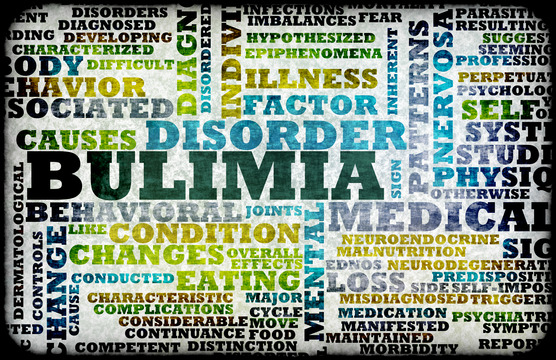
People who get help with mental health tend to get better faster and stay better longer.
Bulimia Nervosa
Bulimia nervosa often involves recurrent and frequent episodes of eating unusually large amounts of food and feeling a lack of control over these episodes. Binge eating is often followed by behavior that compensates for the overeating such as forced vomiting, excessive use of laxatives or diuretics, fasting, excessive exercise, or a combination of these behaviors.
People with bulimia nervosa usually maintain what is considered a healthy or normal weight or are slightly overweight. They often fear gaining weight, want desperately to lose weight, and are intensely unhappy with their body size and shape. Usually bulimic behavior is done secretly because it is often accompanied by feelings of disgust or shame. The binge-eating and purging cycle happens anywhere from several times a week to many times a day.
Other symptoms include:
- Chronically inflamed and sore throat
- Swollen salivary glands in the neck and jaw area
- Worn tooth enamel, increasingly sensitive and decaying teeth as a result of exposure to stomach acid
- Acid reflux disorder and other gastrointestinal problems
- Intestinal distress and irritation from laxative abuse
- Severe dehydration from purging of fluids
- Electrolyte imbalance (too low or too high levels of sodium, calcium, potassium and other minerals) which can lead to heart attack.
People who get help when they have eating disorders tend to get better faster and stay better longer.
For more information on eating disorders:
http://www.nimh.nih.gov/health/topics/eating-disorders/index.shtml
http://www.apa.org/topics/eating
http://www.ulifeline.org/topics/131-eating-disorders
Get Support
